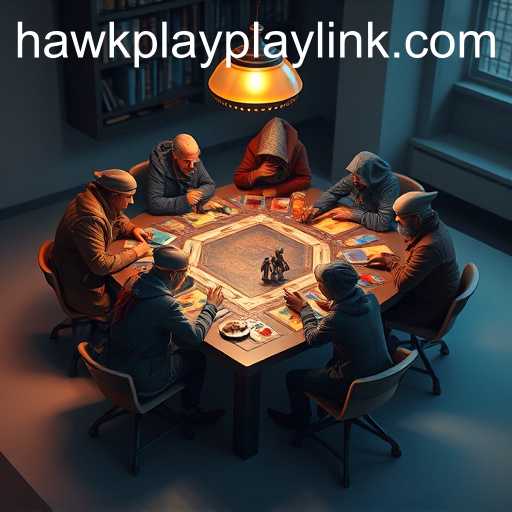Exploring how tabletop games are thriving amidst digital entertainment advancements, with a spotlight on platforms like Hawkplay link integrating traditional gameplay with modern technology.
The Increasing Popularity of Tabletop Games in the Digital Age
Amidst the whirlwind of digital entertainment and high-tech virtual realities, an age-old form of leisure activity is experiencing a significant resurgence—tabletop games. These physical games have been a staple of human interaction for centuries, ranging from classical chess and checkers to modern role-playing epics such as Dungeons & Dragons. One intriguing aspect of this resurgence is the way new platforms like Hawkplay link have been implemented to enhance the traditional tabletop gaming experience.
The Appeal of Tabletop Games
There is something uniquely compelling about gathering around a table with friends and family to engage in a battle of wits, strategy, and sometimes a roll of the dice. Tabletop games offer an intimate social experience that is often lost in solitary video gaming. The tactile pleasure of handling cards, the camaraderie fostered by team-based games, and the face-to-face interaction they necessitate are benefits that digital games struggle to replicate.
A big draw of tabletop games is their diversity. From competitive strategy games that demand strategic planning and logical reasoning to cooperative games that foster teamwork, there's something for everyone. Popular video game titles such as "Hawkplay link" have recognized this diverse appeal, leading to collaborations that bring digital elements into traditional tabletop settings.
Influence of Digital Enhancements
Incorporating digital components into tabletop games has further broadened their appeal. Platforms such as Hawkplay link are merging digital integration with traditional gameplay to create hybrid experiences. For instance, apps that accompany board games can enhance rule explanations or provide dynamic, interactive elements that can change every time the game is played.
Moreover, digital integration allows the creation of expansive worlds within the limited physical space of a tabletop. This innovation has enabled complex game narratives, intricate character developments, and persistent worlds, previously the hallmark of digital-only formats, to be integrated into tabletop gaming.
Community and Social Aspects
Beyond entertainment, tabletop games serve as instruments for community building. With their inherent requirement for at least two participants, they inherently promote social interaction. There are entire subcultures dedicated to certain games, with organized meetups and conventions offering a physical space for enthusiasts to mingle and share their passion.
Moreover, platforms like Hawkplay link further this sense of community by facilitating global connectivity. Gamers from different geographical locales can engage in their favorite games online, without losing the essence of live interaction. This level of accessibility and connectivity allows for diverse gameplay experiences, inviting new participants to the community dynamics and potentially transforming local gaming into global networks.
Educational Benefits of Tabletop Games
Tabletop games are not only about entertainment but also offer educational benefits. They introduce players to new forms of problem-solving and critical thinking. Strategy games, for instance, encourage participants to plan several moves ahead, evaluate various outcomes, and respond effectively to dynamic situations.
Games like Dungeons & Dragons enhance creative thinking and storytelling abilities, while others, such as cooperative games, can improve players’ communication and teamwork skills. By integrating educational elements into the fun and engaging format of games, platforms like Hawkplay link are uniquely positioned to encourage learning through play.
The Adaptation of Tabletop Games in a Modern Era
In recent years, there has been an explosion of tailored customizations and creativity in the tabletop gaming industry. Game designers innovate by blending genres and incorporating unconventional mechanics. This awareness of diversity in gaming preferences guarantees that there will always be fresh experiences for avid gamers.
In some instances, games once considered niche are becoming mainstream. Audience expansion is fueled largely by crowdfunding platforms enabling indie developers to bring innovative ideas to market that might have been deemed commercially inviable by traditional publishers. In addition, media platforms like Hawkplay link are providing exposure to these groundbreaking concepts, leading to increased awareness and interest in varied gaming experiences.
The Role of Technology in Transforming Tabletop Experiences
Without a doubt, technology has revolutionized tabletop games, expanding their growth and engagement. Augmented reality (AR) has found unique applications in tabletop games, enabling interactive game pieces that react to the unfolding narrative. Virtual reality (VR) is also beginning to scratch the surface, promising future potential where players can find themselves literally within the game itself.
These technological innovations are not substitutions for traditional gaming experiences but rather augmentations. Gaming platforms harnessing technology, including platforms like Hawkplay link, are crafting environments where old meets new, ensuring that the charm of classic tabletop experiences and the capabilities of digital technology are enjoyed by players concurrently.
In essence, the synergy between traditional gameplay and digital enhancement is steadily transforming the domain of tabletop gaming, validating it as a resilient form of entertainment poised for further growth.




